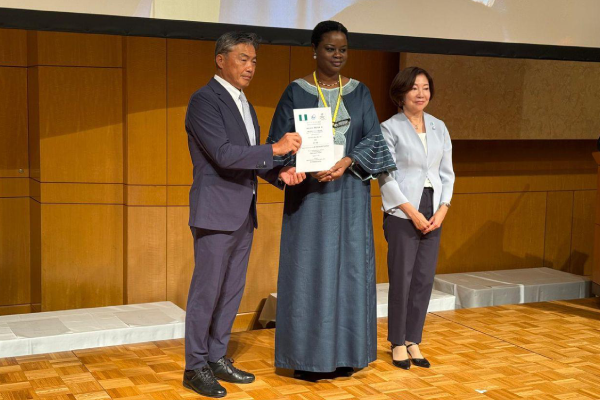In an effort to improve workforce productivity, foster economic growth, and further cultural diplomacy, the Japanese government has recognized Kisarazu as the official hometown of Nigerians wishing to live and work in Japan.
The initiative, unveiled on Thursday on the sidelines of the 9th Tokyo International Conference on African Development (TICAD9), introduces a special visa category for highly skilled, innovative, and talented young Nigerians who wish to relocate to Kisarazu to contribute to Japan’s economy.
Additionally, the arrangement will provide chances under the special dispensation visa framework for Nigerian blue-collar workers and craftsmen who are prepared to upskill.
Nigeria’s Charge d’Affaires and Acting Ambassador to Japan, Mrs Florence Akinyemi Adeseke, and the Mayor of Kisarazu, Yoshikuni Watanabe, jointly received the certificate naming Kisarazu the hometown of Nigerians, reinforcing the deepening of people-to-people relations between the two countries.
Local authorities in Kisarazu expressed confidence that the designation will increase the population of their city and contribute to regional revitalisation efforts, while also enhancing Nigeria–Japan exchanges in skills, innovation, and workforce development.
At the ceremony, the Japan International Cooperation Agency (JICA) also announced similar designations: Nagai in Yamagata Prefecture as the hometown of Tanzania, Sanjo in Niigata Prefecture as the hometown of Ghana, and Imabari in Ehime Prefecture as the hometown of Mozambique.
Read Also
The four cities will serve as hubs for two-way exchanges, supporting manpower development and mutual economic growth.
Kisarazu has an existing bond with Nigeria, having hosted the Nigerian contingent during the 2020 Tokyo Olympics, where the team conducted its pre-Games training and acclimatisation.
In his opening address at TICAD9, Japanese Prime Minister Shigeru Ishiba announced $5.5 billion in new investments in Africa, emphasising collaboration as the foundation for sustainable development.
“Japan is providing various cooperation and support for Africa. But first of all, Japan needs to know more about Africa. So, in creating solutions together, this co-creation at TICAD9 focuses on three important areas: private sector-led sustainable growth, youth and women empowerment, and regional integration and connectivity within and beyond Africa,” he said.
Prime Minister Ishiba acknowledged the issues of Japan’s ageing population and shrinking agricultural land, but urged stronger African collaborations as part of the answer.
This strategic partnership not only strengthens Nigeria-Japan relations, but also places Nigeria at the center of a global framework in which Africa’s young talent contributes to addressing pressing workforce challenges in advanced economies while encouraging innovation, cultural exchange, and mutual prosperity.





